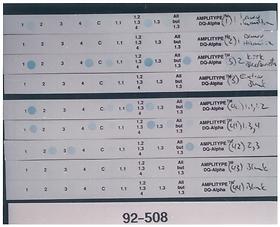Cases
Rescued from death row: Kirk Bloodsworth and the Innocence Project
After an anonymous tip and eyewitness testimony placed him near the crime scene, Kirk Bloodsworth was sentenced to death in Maryland for the 1984 sexual assault, murder, and mutilation of 9-year-old Dawn Hamilton. Bloodsworth insisted on his innocence and no physical evidence linked him to the killing. In prison he learned about DNA profiling. Eventually his attorney, Bob Morin, with support from the Innocence Project, a nonprofit legal clinic formed to promote the use of DNA analysis to exonerate innocent prisoners, persuaded officials to compare Bloodsworth's DNA with the DNA of dried sperm found on the victim. The results exonerated Bloodsworth. He was freed from prison in June 1993—the first death-row prisoner to be exonerated by post-conviction DNA testing.
In 2003, after much prodding from Bloodsworth and Innocence Project lawyers, Maryland authorities finally searched their DNA database for a "cold hit" match of the evidence in the Dawn Hamilton case. The search turned up Kimberley Shay Ruffner, a convicted rapist who Bloodsworth had known in prison, who was then tried and found guilty of the 1984 murder.
Bloodsworth's story shows the promise of DNA testing for clearing the innocent and identifying the guilty. In 2003, Congress passed the "The Kirk Bloodsworth Post-Conviction Federal Grant Testing Program," creating a federal DNA testing program. Today, over 30 state and regional innocence projects are at work. By August 2004, 144 prisoners, some on death row, had been exonerated by DNA testing.
Bloodsworth currently works with the Justice Project, a non-profit group that campaigns for legislation to correct flaws in the American criminal justice system that result in the conviction of innocent men and women on death row for crimes they did not commit.
